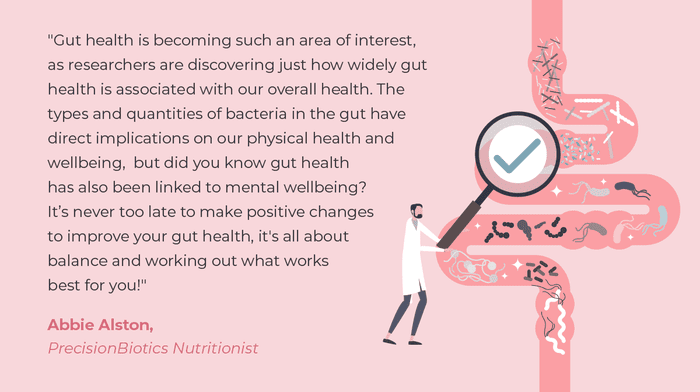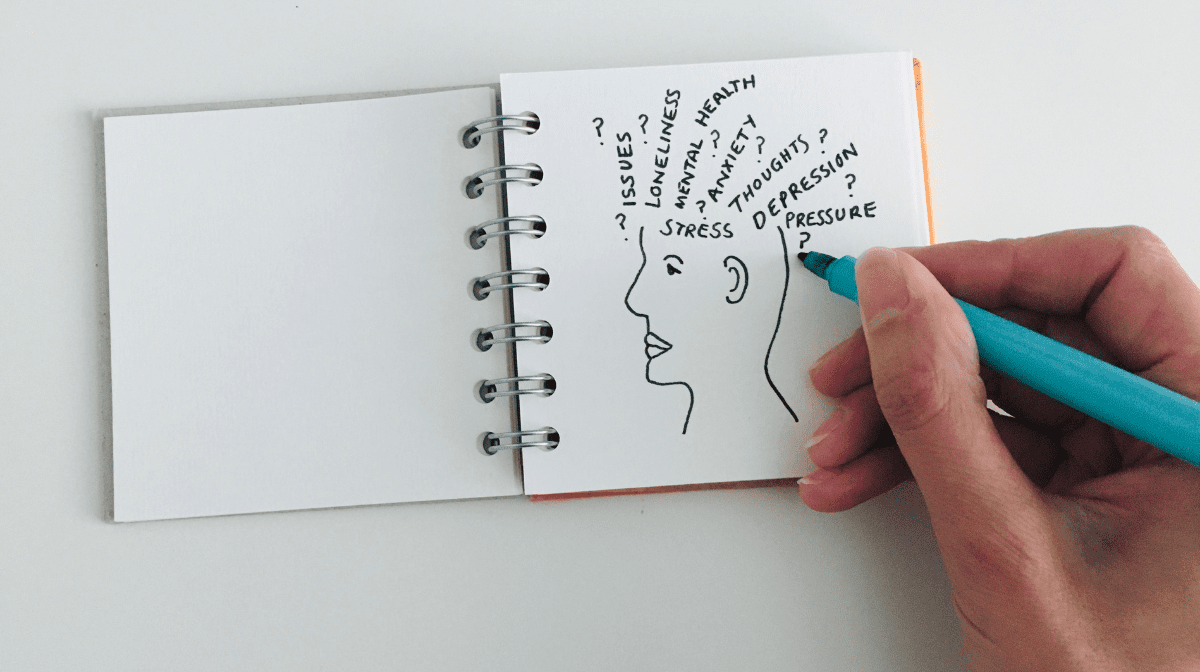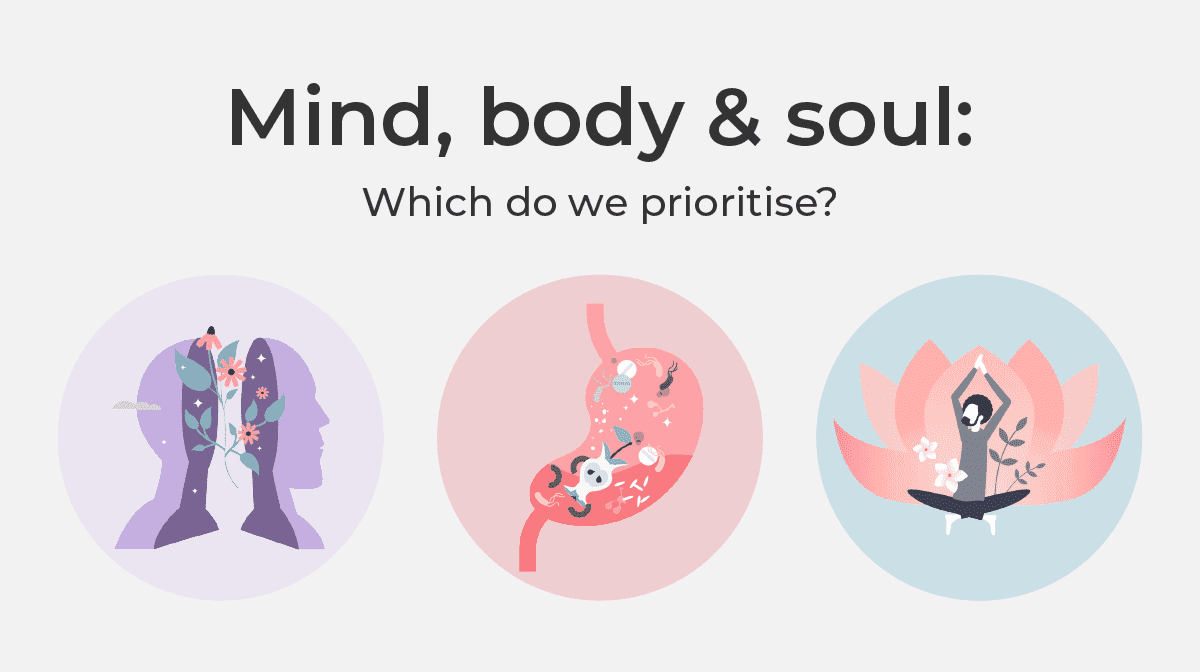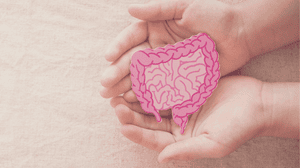Too often, health is equated simply to physical fitness. In reality, true self-care isn’t about focusing only on looking after the body; it’s a holistic approach that involves taking care of your physical, mental and even your spiritual wellbeing. But as a nation, what are our attitudes towards these aspects of health and how do we prioritise them?
To find out we polled 1,000 adults across the UK, asking them a wide range of questions covering the topics of mind, body and soul. Here’s what we discovered…
Body

At PrecisionBiotics, we know that diet plays a key role in wellbeing - and it seems as though most of you agree. When asked what good physical health looks like to them, choosing from a list of multiple choice options, nearly four-fifths (79.9%) of our survey respondents said ‘eating a healthy and balanced diet’ (14.11% of the total answers).
Women seem to place even greater emphasis on the food they eat, with 82.68% of female respondents selecting this response, compared to 76.36% of men. Age appears to impact attitudes towards the importance of diet too. Nearly nine in 10 of the over 54s (87.58%) said eating a healthy diet was important for physical health (the highest of any age group), while at the other end of the spectrum, only 72.55% of 18-24s ticked this box.
‘Getting eight hours of sleep a night’ was the second most popular response, followed by ‘walking every day’. Although it wasn’t a top answer, many people are aware of the significance of gut health, with 34.2% of respondents noting that good physical health involves ‘taking care of your gut by eating a varied diet including probiotics’.
When asked how to rate their relationship with their physical health on a sliding scale, with 0 being ‘poor’, 5 being ‘balanced’ and 10 being ‘exceptional’, the most common response was 5. Nearly a quarter of respondents (24.5%) selected this. The over 54s were most likely to say they had a balanced relationship with their physical health at 28.10%, while more women than men selected this answer (28.75% compared to 19.09%).
Probiotics vs prebiotics
The trillions of microbes living in our bodies affect everything from our immune systems and digestion to our cognitive function and even our mood. At PrecisionBiotics, the human microbiome is our business - but how much do the general public know about this crucial element of human health?
We asked if people know the difference between a probiotic and a prebiotic. Perhaps surprisingly, only 11.6% of respondents selected the correct response - which is that while probiotics are supplements or foods containing live microbes that help to improve or maintain the body’s ‘good bacteria’, prebiotics are foods (often high in fibre) that serve as nutrition for these bacteria and are intended to improve the balance of these microbes in the body.
Just over half of those polled said they didn’t know the difference, while nearly two-fifths chose incorrect responses. Younger people appear to be much more clued up on this topic than their elders. Whereas 17.65% of the 18-24s correctly identified the difference between probiotics and prebiotics (the highest of any age group), only 7.84% of the over 54s managed to do so.
Despite this apparent lack of knowledge, when asked for their thoughts on the statement “experts say that the key to overall good health is having a healthy gut”, 77.9% of our respondents said they either somewhat or strongly agreed.
Mind

Traditionally, mental wellbeing tended to take a backseat to physical health, but thankfully there’s an increasing awareness of the significance of this issue. So, what did the people we polled have to say on this critical topic?
When asked to rate their relationship with their mental health on a sliding scale from 0 to 10, as with physical health, the most common response was 5 (a ‘balanced’ relationship). Over a fifth of respondents (21.3%) selected this answer.
Given a list of multiple choice options on what good mental health looks like to them, the most popular answer was ‘sleeping well’. Nearly seven in 10 people chose this response (19.6% of the total answers). This was followed by ‘having the ability to handle stressful situations in life’ and then ‘making healthy choices in your life’.
Perhaps unexpectedly, only 13.6% of respondents ticked the answer ‘going to therapy regularly to maintain good mental health’. It’s often said that women are better at talking about their feelings than men, and this was borne out in our data - with 16.96% of women selecting this answer, compared with only 9.32% of men.
Asked to describe their current mental health, 62.5% of people said it was ‘okay’ and 13.2% said it was ‘at its best’. Worryingly though, just over a fifth (20.1%) stated they were ‘struggling’, while 4.2% revealed their mental health was ‘at its lowest’. The age group that appeared to have the greatest concerns about their mental wellbeing were the 45-54s, with 26.01% of people in this demographic saying they were struggling and 6.36% stating they were at their lowest.
The most popular activity for boosting mental health was identified as talking to friends and family - with 55.6% of respondents selecting this option (18.48% of total answers). Solitude was also identified as important for wellbeing however. Nearly half of the people polled (47.5%) said they spend time alone to help with their health (15.79% of the total answers). Regular exercise took the third spot overall, and was in fact the top answer among men aged 45 and above and women aged 54 and over.
There seems to be a growing awareness of the impact of the microbiome on mental health as the majority of survey respondents (62.4%) said they agreed with the statement ‘experts believe that gut bacteria plays a key role in your mood and mental health’.

Mental health takes poll position
When asked to rank physical, mental and spiritual health in order of importance for overall wellbeing, mental health took the top spot, followed by physical health and then spiritual health.
Spirit

While most people have a good understanding of the concepts of physical health and mental health, our grasp of spiritual health can be somewhat vague. With this in mind, we asked our survey respondents what the term means to them. The most popular answer was a ‘human connection with yourself and others’. Over a third of people (37.1%) selected this answer (18.5% of the total responses). This was followed by ‘being connected with nature’ and ‘having a purposeful life’. However, among men and respondents aged over 35, being connected with nature was the top answer.
Chiming with this result, when asked what kind of spiritual activities they practise, the most popular answer was spending time out in nature. Gardening took second place, followed by practising positive feelings such as peace and empowerment.
Nearly half of those we surveyed (46.2%) said spiritual activities make them feel more positive (22.76% of the total answers), while 33.7% stated they feel at peace and 32.3% said they feel hopeful. Only 6.7% of respondents said they don’t feel that spiritual activities help.
Most of those polled (64.7%) said they either somewhat or strongly agree with the statement ‘doctors do not have an understanding of the importance of spiritual health’.
How do you look after mind, body and soul?
Whether it’s taking probiotics to enhance gut health, making time to talk to friends and family or getting out into nature to connect with your spiritual side, there are lots of things we can do to look after mind, body and soul.
So, what are your self-care go-tos? Join the conversation on #MindBodyGut.
Discover more about Mental Wellbeing

What does anxiety feel like? Spot the signs and find the best next steps
Anxiety is a normal and natural state our body enters, learn more about the signs and ways to deal with anxiety.

Top 5 Health and Wellness Books for 2023
Discover our top five health and wellness books for this year
Shop Supplements
- PrecisionBiotics Pollfish Survey
- https://www.bhf.org.uk/informationsupport/heart-matters-magazine/nutrition/how-can-i-improve-my-gut-health
- https://www.royalmarsden.nhs.uk/rm-magazine/qa-microbiome
Related Articles








